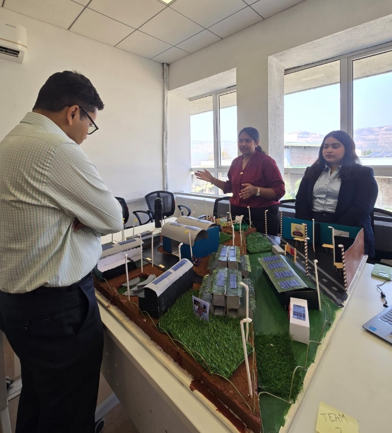UNIVERSITY HIGHLIGHT
International Week at Vijaybhoomi University
|
 |
Vijaybhoomi University successfully hosted International Week 2026, bringing together global academic perspectives through engaging sessions with our esteemed partner universities; University of Texas at Arlington, ESDES Business School, Lucerne School of Business, and University at Albany. The week-long initiative created meaningful opportunities for students to interact with international faculty, explore global learning pathways, and understand emerging trends shaping higher education worldwide.
Through insightful discussions on cross-cultural learning, international mobility, and industry-aligned education, students gained valuable exposure to diverse academic ecosystems and global career possibilities. The sessions reflected Vijaybhoomi University’s commitment to fostering international collaboration and nurturing future-ready learners with a global mindset. International Week stood as a testament to the university’s vision of learning beyond borders, empowering students with knowledge, cultural intelligence, and the confidence to thrive in an interconnected world.
- Nidhishwar Singh, BBA, 3rd Year
|
SCHOOL HIGHLIGHTS
Honouring a Visionary: VSIS-JC Exhibition Pays Tribute to Shri VB Padode
|
  |
Founder’s Day at Vijaybhoomi Singapore International School (VSIS) Junior College, became a heartfelt tribute to the legacy and vision of Shri VB Padode, bringing together faith, creativity, and innovation in a meaningful celebration. The day began on a peaceful note with prayer songs and heartfelt poems that filled the atmosphere with gratitude and remembrance. Soon after, the campus buzzed with excitement as the STEM Exhibition, organised and hosted by the dedicated students and staff of VSIS, opened its doors.
 Junior college students confidently presented projects that blended Science and Commerce in practical, real-world ways. Some developed mobile applications, others built working models, while a few explored ideas related to campus development and industry concepts. There were smart electric power generation systems and even creative solutions for sourcing water from natural resources. The energy, teamwork, and passion behind each project were truly inspiring. The exhibition beautifully reflected the spirit of VSIS; innovative, collaborative, and future-ready, honouring the vision that continues to guide the community. Junior college students confidently presented projects that blended Science and Commerce in practical, real-world ways. Some developed mobile applications, others built working models, while a few explored ideas related to campus development and industry concepts. There were smart electric power generation systems and even creative solutions for sourcing water from natural resources. The energy, teamwork, and passion behind each project were truly inspiring. The exhibition beautifully reflected the spirit of VSIS; innovative, collaborative, and future-ready, honouring the vision that continues to guide the community.
- By Tanushka Phatak, VSIS-JC
|
|
Center of Continuous Learning and Employability
FutureWorks Session on the Careers in the GCC
|
|
|
The recent session on Global Capability Centres (GCCs) offered valuable insights into how India is rapidly transforming into a global innovation powerhouse. Once established primarily for cost efficiency and back-office support, GCCs have evolved into strategic hubs driving digital transformation, research, and product innovation.
The discussion explored India’s strong talent ecosystem, policy support, and technological advancements that have positioned the country at the centre of global GCC expansion. With projections indicating significant growth in the coming years, GCCs are reshaping corporate operations, creating new career opportunities, and strengthening India’s role in the global business landscape. The session also highlighted emerging roles across AI, analytics, cybersecurity, and business operations, offering students and professionals a deeper understanding of future-ready skillsets and industry trends.
- By Bhargavram Krishnapur, VSST, 2nd Year
|
|
|
 |
Purpose of
Education
|
|
|
On his 91st birth anniversary, we honour Shri Vijaysinh Ji Padode, the founder of Vijaybhoomi University and a man who reduced the philosophy of education to a timeless truth: Education is Enablement.
Much like Albert Einstein’s E = mc², his formulation is deceptively simple yet profoundly transformative. Einstein revealed that a small mass holds immense energy. Shri Padode demonstrated that even a small opportunity to learn can unleash immense human potential.
To him, education was never about degrees or status. It was about dignity. About agency. About unlocking the latent strength within every individual. Enablement means equipping a person not merely to earn, but to think, to create, to lead.
At ninety-one, his legacy is not measured in years, but in lives transformed, students empowered, institutions strengthened, futures rewritten.
His equation continues to operate quietly and powerfully: where there is education, there is enablement; and where there is enablement, there is progress.
- Dr Navneet Sharma serves as VB Padode Chair Professor of Competition Policy and teaches at Vijaybhoomi University.
|
|
 |
Recent Episodes:
|
|
|
|
| Join VUTV Community!
|
| The VU Edge |
|
Vijaybhoomi University is India’s first Liberal Professional University, offering a future-ready, industry-aligned curriculum grounded in a liberal professional framework.
Committed to nurturing holistic, socially responsible, and continuously employable professionals, the University fosters learner-centric, multidisciplinary education that encourages self-discovery, innovation, and global relevance across emerging and high-demand fields.
|
| |
 |
| LET'S CONNECT |
 |
 |
 |
 |
|
| Unsubscribe
Clicking this won’t break our hearts... okay, maybe a little!
- 20 February 2026 -
|
|
|
|